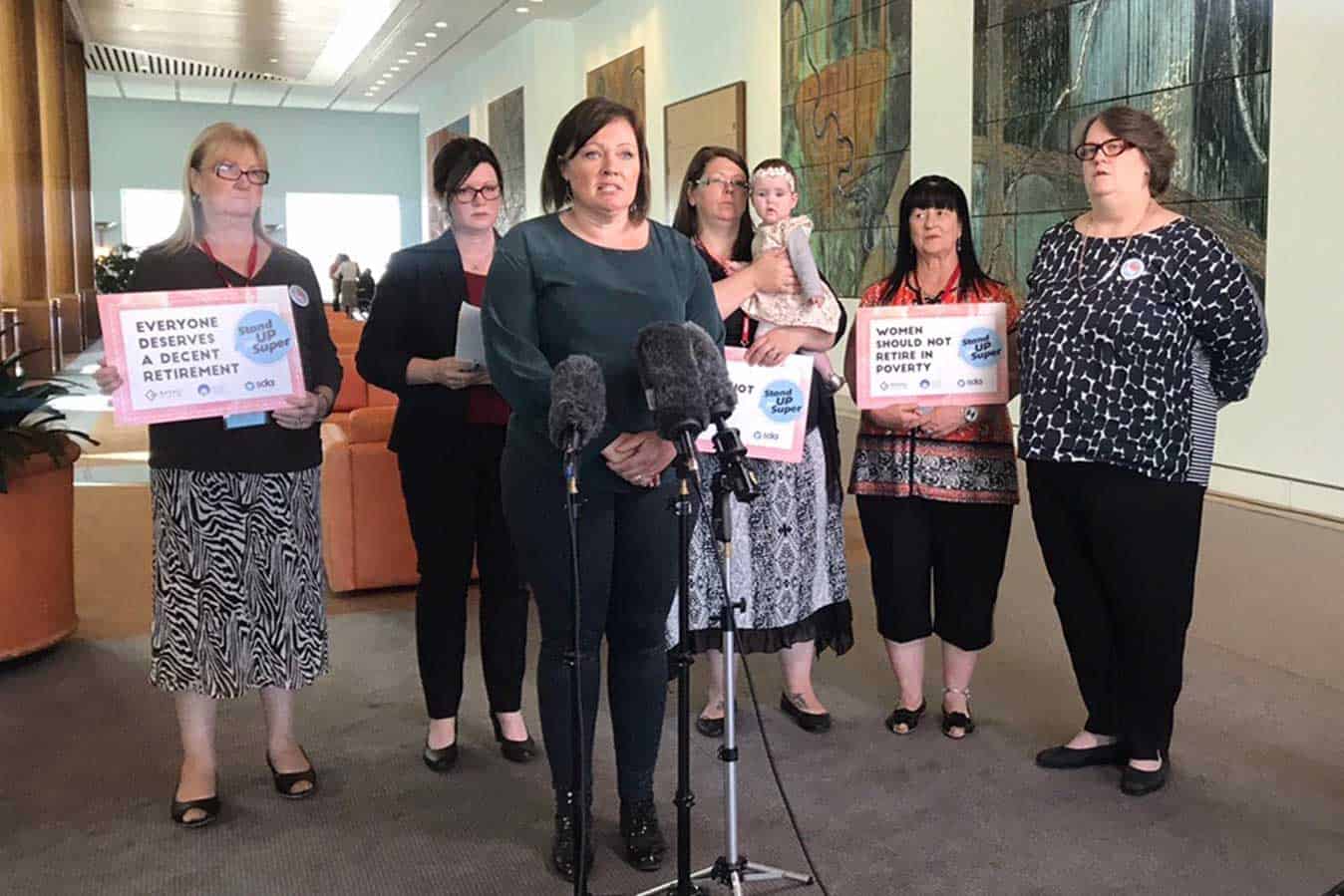Australia’s three largest trade unions joined forces at Parliament House in Canberra today to urge politicians to immediately increase the superannuation guarantee to 12% and take action to break down barriers leading to women increasingly retiring into poverty.
Leaders of the Australian Nursing and Midwifery Federation (ANMF), Australian Services Union (ASU) and The Shop Distributive and Allied Employees Association (SDA), joined by nurses and carers, retail workers and disability workers, highlighted the declining super savings of Australia’s female workers and called on the Federal government to raise the super guarantee, set to gradually increase from 9% to 12% by 2026, urgently.
The rate had been scheduled to progressively rise to 12% by 2022 but was frozen by the Abbott government in 2014.
The large lobby group also drew attention to the failure of successive governments to abolish the $450 minimum threshold per month at where super becomes payable by employers that has seen thousands of vulnerable workers disadvantaged.
According to the 2017 Per Capita report, Not So Super, For Women, working women, particularly those on low incomes, are struggling and have only 53% of the superannuation retirement savings of men, leaving them vulnerable to poverty and homelessness in retirement.
On the back of Retirement Income Review, announced last month by the government, the delegation has been meeting with elected representatives over the past two days to implore them to stand up for super by:
- Protecting the universality of the super system and rejecting attempts to make super ‘optional’ for Australian workers
- Immediately increasing the Super Contribution Guarantee levy to 12%
- Legislating to ensure super is paid on every dollar earned by eliminating the minimum threshold for compulsory employer contributions of $450 per month in earnings, so that every hour worked is linked to superannuation
- Closing the retirement gender pay gap and paying a superannuation contribution at the prevailing SCG rate for the government’s paid and unpaid parental leave
- Remembering that the superannuation system was established to provide a safety net for working people in retirement and that any attempts by politicans to make super optional will undermine the viability of the system and likely force retirees into poverty
ANMF Assistant Federal Secretary Lori-Anne Sharp said the Morrison government’s Retirement Income Review must address the disparity in super outcomes faced by women.
“The Australian nursing and midwifery workforce comprises 89% women, who on average retire with 40% less super than men, even in female dominated industries,” she said.
“We need reform that addresses the current gender pay gap, prioritises an increase to the superannuation guarantee to 12% and includes the superannuation guarantee in the Commonwealth parental leave scheme so women are not penalised for taking time off to raise their families.”
Ms Sharp added that removing the exemption that allows employers to avoid paying super to employees who earn less than $450 per month was long-overdue, with aged care workers who may work for multiple employers, especially at risk.
“Every Australian deserves a secure retirement and comfortable standard of living. The answer is not to make superannuation optional for low-income earners as has been suggested by some Liberal Senators recently. The answer is to keep to the legislated plan to increase the super guarantee to 12% and urgently address barriers that women face when saving for retirement.”
ASU Assistant National Secretary Linda White echoed the calls.
“Over 70% of women have estimated balances under $150,000 and almost a quarter have balances less than $50,000, meaning we must find ways to increase the level of women’s super,” she said.
“The government should honour their promise to raise super to 12%. What’s more it should be done immediately.”
SDA National Assistant Secretary Julia Fox said every woman deserved a secure and comfortable retirement, but women working in the retail industry routinely retire with almost half the retirement savings of men.
“The retail industry is a low paid industry with a high proportion of casual and part-time work. We are seeing women having to work multiple jobs to make ends meet yet the $450 cap means they may not be earning any super.”








